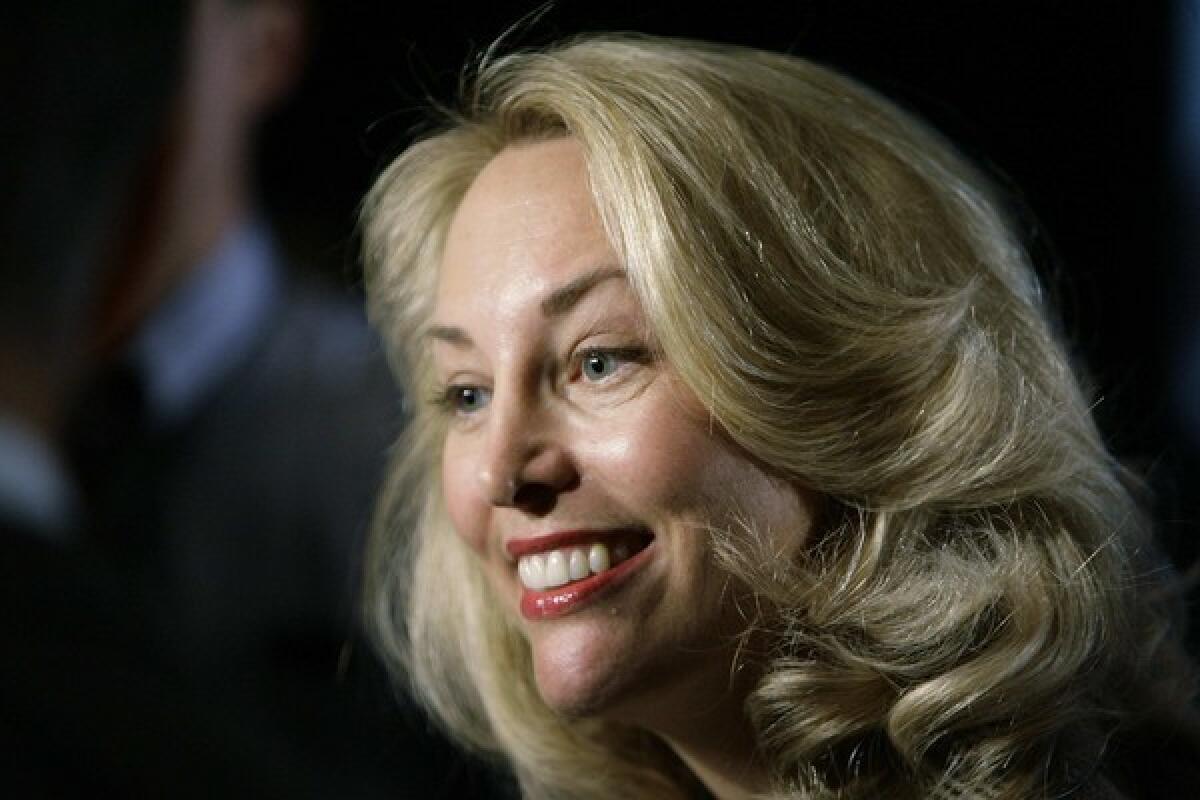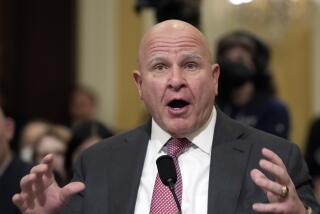Outed CIA officer Valerie Plame has advice for whistleblower under fire

WASHINGTON — Valerie Plame, whose role as an undercover CIA operative was famously blown in an act of political retribution in 2003, has some advice for the still-anonymous whistleblower who sparked the Trump impeachment investigation: Be prepared to see your life turned upside down.
“Your name is being tossed out in the public sphere and it’s being distorted and who you are and what you’ve done,” Plame said Thursday in a telephone interview, recalling her experience. “I found it very disorienting.”
Plame, a Democrat who is running for a House seat from New Mexico, recalls getting stares and hearing whispers at preschool dropoffs and supermarket lines, seeing her husband challenged to a fight at an airport, and holding awkward conversations with friends and family whom she had misled for years about her life as a spy.
She said she was horrified by attempts by President Trump and some of his allies to identify and smear the motives of the individual — reportedly an intelligence officer — who filed the complaint despite federal laws intended to shield whistleblowers from retribution.
As he left the White House on Friday, Trump complained repeatedly to reporters, slamming the “fake whistleblower” as a “disgrace to our country.” The individual’s identity, he added, “should be revealed.”
Although a parade of White House, State Department and other officials have confirmed and expanded on the whistleblower’s account, the president and his allies have suggested that anonymity is proof of partisan bias.
Trump long has attacked anyone who criticizes him as biased or corrupt. In September, days after the complaint was revealed, Trump likened the whistleblower to a spy inside the White House who had committed treason.
At a Louisiana rally on Wednesday, Trump read a tweet that the whistleblower’s attorney, Mark Zaid, had sent soon after Trump’s inauguration in 2017 that said “a coup has started” and “impeachment will follow ultimately.”
“His lawyer, who said the worst things possible two years ago, he should be sued and maybe for treason,” Trump told reporters Friday.
The whistleblower’s lawyers warned the White House this week that the president’s efforts to unmask the whistleblower were putting their client in danger.
Zaid warned in a statement that anyone identifying a suspected name for the whistleblower would put “that individual and their family at risk of serious harm,” and would deter future whistleblowers from coming forward. He said he would not confirm or deny any name published or promoted by the president or his supporters.
Zaid’s co-counsel, Andrew P. Bakaj, sent a letter to White House Counsel Pat A. Cipollone on Thursday warning of “the legal and ethical peril” that Trump could face if anyone is “physically harmed as a result of his, or surrogates’ behavior.”
So far, no mainstream news organization has named the individual. Donald Trump Jr. linked on Twitter to an article in Breitbart, a far-right website, which cited another conservative news outlet that purported to name the person. Trump Jr. denied coordinating with the White House, and the name has not been confirmed.
Sen. Rand Paul (R-Ky.), who appeared with Trump at a rally Monday in Lexington, Ky., urged the media to out the whistleblower while declining to do so himself. “Do your job and print his name,” he said.
On Wednesday, Paul blocked a Senate resolution that would have reaffirmed support for whistleblower protections, prompting an exchange with the bill’s sponsor, Sen. Mazie Hirono, a Hawaii Democrat.
“Let’s be clear. The real purpose of these attacks is to scare anyone else who may be thinking of coming forward to stay silent,” Hirono said on the Senate floor.
Trump’s daughter Ivanka offered a different view from her father, telling the Associated Press on Friday during a visit to Morocco that the whistleblower’s identity is “not particularly relevant aside from what the motivation behind all this was.”
“The whistleblower shouldn’t be a substantive part of the conversation,” she said because the person “did not have firsthand information.”
Transcripts from closed-door impeachment hearings released this week show that Republican attorneys have asked questions in several hearings intended to reveal or confirm the person’s identity. None of the witnesses did so.
Republicans have also sought to force the whistleblower to testify in Congress, rejecting Zaid’s offer to have his client answer their written questions.
“All whistleblowers are not created equal,” Sen. Ron Johnson (R-Wis.) said Thursday on Fox News. He called the whistleblower an “anonymous informant” and said “it was pretty unreasonable for the whistleblower to expect to remain anonymous.”
Trump has claimed that the whistleblower gave false information in a complaint that alleged Trump pressured Ukrainian President Volodymyr Zelensky to investigate Democrats, including former Vice President Joe Biden, after freezing nearly $400 million in U.S. aid to Ukraine.
But a memorandum of the call, released by the White House, and testimony by multiple witnesses have borne out the whistleblower’s narrative. Three witnesses are scheduled to testify next week in the first public hearings of the impeachment inquiry.
The current circumstances do not directly echo Plame’s. But there are similarities.
She was thrust into the spotlight after her husband, Joe Wilson, a former diplomat, had written an op-ed that publicly contradicted part of President George W. Bush’s justification for going to war in Iraq.
The CIA had sent Wilson to the African nation of Niger to investigate whether it had sold a uranium concentrate to Iraq for a suspected nuclear weapons program. Wilson, who died in September, quickly determined the claim was false.
But administration officials, in an apparent act of retaliation, suggested Wilson only got the job because he was married to a CIA officer, and leaked her name to several reporters. A subsequent investigation led to the jailing of a New York Times reporter who refused to reveal her source and the conviction of a top White House official for lying and obstruction.
Plame sees a common thread: “Shoot the messenger. Trump is fantastic at this tactic — ‘Look at the shiny ball,’” she said.
Plame said she fears the whistleblower could face personal danger as the rhetoric escalates. She said she was denied protection for her and her family after they received a credible threat.
“I felt somewhat, frankly, abandoned by the leadership of the CIA. They didn’t know what to do with me. I was such a political hot potato,” she said.
In the end, Plame said she relied on friends and family for support — and urged the whistleblower to do the same.
“This will be a storm, you will need them,” she said. “He’ll just have to hunker down and try to weather this.”
More to Read
Get the L.A. Times Politics newsletter
Deeply reported insights into legislation, politics and policy from Sacramento, Washington and beyond. In your inbox three times per week.
You may occasionally receive promotional content from the Los Angeles Times.











